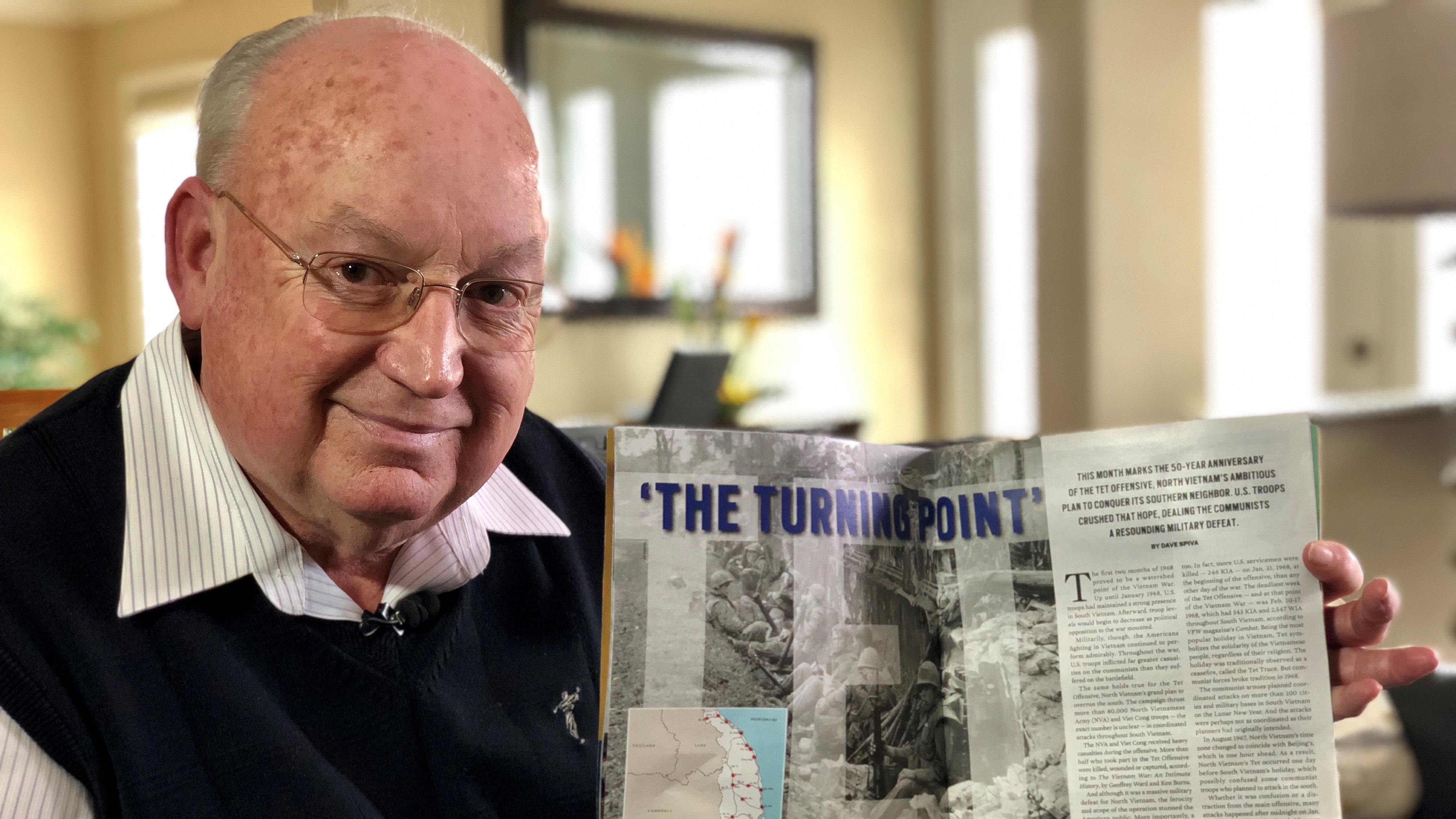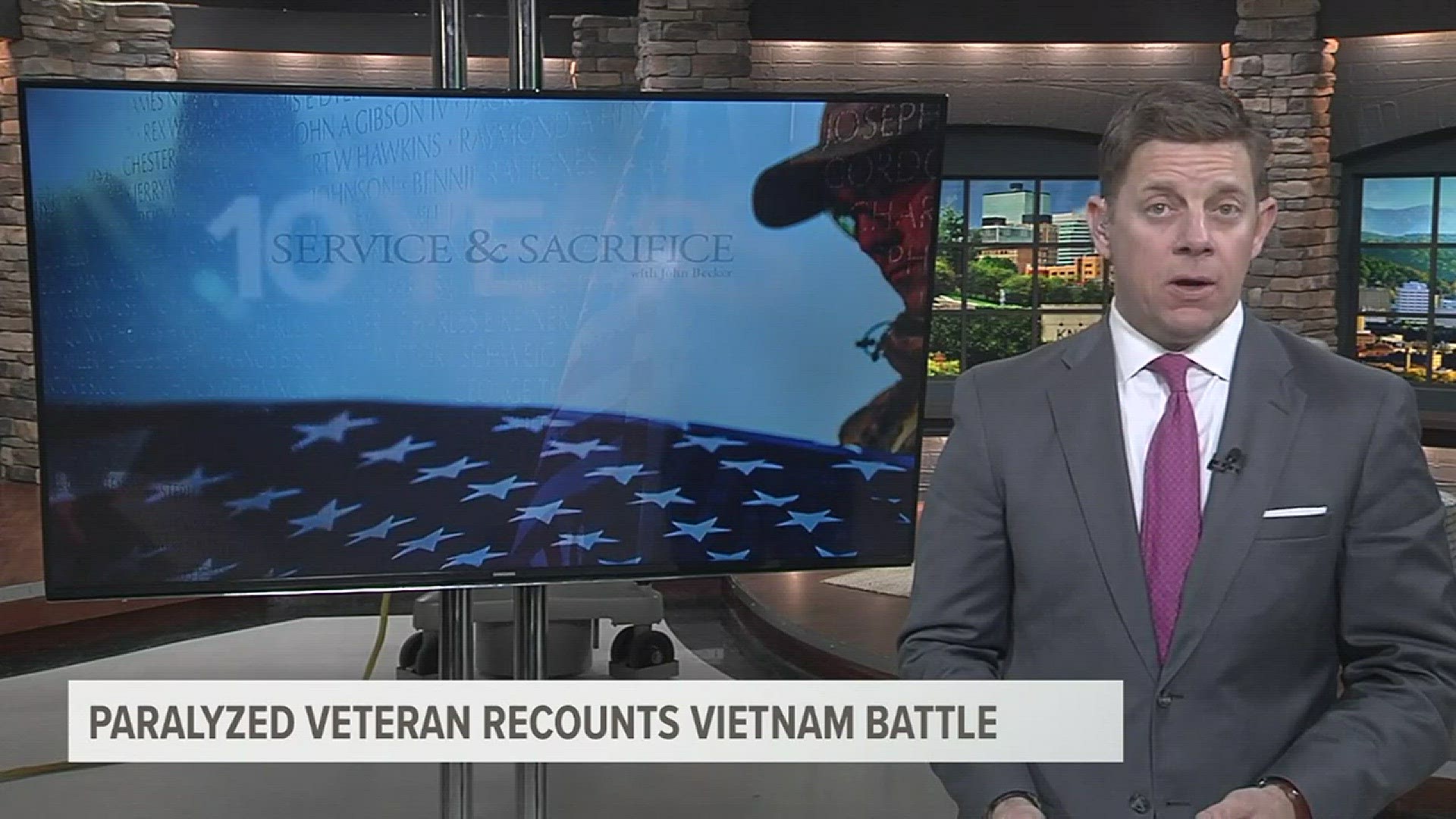A bullet from a sniper pierced the spine of Bill Prince during the battle for Hue City in Vietnam in 1968. The Marine credits that moment - and his reaction to it - for changing the course of his life.
“You go through all the emotional baggage of, I may never recover from this, I may never walk … I (said to myself) I can help a lot of veterans if I get through this,” explained Mr. Prince sitting in his home in Tellico Village.
Fifty years to the day after he was shot, Mr. Prince told 10News anchor John Becker doctors suggested the range of his recovery would be determined by the effort he put into rehab. The combat veteran got to work.
Within 30 days he began to regain feeling in his feet.
Not only did he volunteer to return to frontline duty, the Marine infantry sergeant commanded more than two dozen troops on a second tour in Vietnam.
“My first tour was shortened and I thought, I need to go do my tour and I need to help educate and maybe keep some others alive,” Prince said.

Of the 29 soldiers under his command, all 29 returned home safely after their tour. It was a stark contrast to the many friends and fellow Marines he saw killed in the battle for Hue.
“I think I know maybe 35 to 40 on the (Vietnam Memorial) Wall,” Prince said.
His first job out of the Marine Corps was with the Tennessee Department of Veterans Affairs. He then went on to work for three U.S. presidents including as deputy assistant secretary of labor in the Reagan administration.
“Vietnam unemployment was about 15 percent in the country at that time, so when I left that office to go to work at the White House on drug policy issues, we had the unemployment rate below six percent, so I’m very proud of that fact,” Prince said.
In addition to our on camera interview about his experience at war, Prince also answered the following 10 questions about the impact his military service had on the rest of his life.
1. What one person influenced you most in life?
Other than my mother, it would have to be my high school English teacher, the late Mrs. Edith Apperson. My school was a “technical” high school, which meant most of the students were not planning on going to college, mostly because of economic reasons. She recognized in me a talent, and an enthusiasm for public speaking. With her coaching, I achieved early success in several oratorical contests. Gaining self-confidence, I realized that leadership development was as important as my skill training. I learned that college was important, but not absolutely necessary, for success in the world of work.
2. Do you feel honored and respected for serving your country?
Not when I first returned from the war. It was obviously an unpatriotic environment. After the 9/11 attack on our country, Americans realized the importance of a strong military. Now I do feel honored and respected. The word veteran has returned to its rightful place in the hearts of most of our citizens.
3. How can people thank you for your service?
VOTE! Also, when you see someone wearing appropriate veteran identifying attire, i.e. ball cap, shirt, jacket, etc., just smile or give us a thumbs up and say thanks.
4. How do you honor your fellow men and women?
One of my first jobs after coming home from Vietnam was as a field representative for the Tennessee Department of Veterans’ Services, so I filed a lot of benefit claims for veterans and/or widows. I offer advice and counsel, wherever I can, on compensation, pension or even health care. Some just want a confusing letter properly interpreted. As a neighbor on the street, or as a speaker at a veterans function, I try always to express gratitude for those who have served to protect our liberty. I proudly fly the flag of my country, and I pray for God’s protection of our servicemen and servicewomen.
5. How do you think this generation of service men & women is different or similar to yours?
I’m not sure there is a lot of difference. Patriotism, a more rapid maturation process, incentives after service (GI Bill, home loans, etc.), all contribute to people enlisting. Basically, we love our country, and we want to keep it from harm, and make it better than it was before we came along.
6. What influence did your military service have on the rest of your life?
War taught me that I can survive the toughest that life has to throw at you. I went away from America as a scared kid, and came home understanding discipline, responsibility, compassion, forgiveness and a clearer believe in my purpose in life. I learned that “public service” to America can be a noble occupation, after you’ve done your fair share of fighting for her.
7. Does your family have a history of military?
My father was in the Army in World War II, going ashore at Omaha Beach, on D-Day + 1.
8. Would you encourage your son, daughter or other younger generations in your family to join the service?
Absolutely, I would. My son and daughter are both in their mid-40s now, but I am blessed with five grandchildren. While you hope that your family is not put in harm’s way, the military instills self-pride, courage, fiscal responsibility and strong work ethic … all the traits that will make you successful in life.
9. After seeing it and living it, how has your opinion of war changed?
I wish it didn’t exist. In truth, I believe it will always exist, somewhere in the world. No Hollywood movie can accurately portray war’s effect on the individual who is caught up in it. It is horrible beyond description! Yet, we all know that the world will always have some “bullies” who want to force their will on you. Somebody has to stand up and fight against attempts to make us less than what we are, and what we can become.
10. How did your military experience shape your religious faith?
It taught me tolerance of all faiths, and strengthened my belief in MY God. The profound feeling of your own clothes soaking up your own blood ensures that you are NOT a non-believer. I was told, while lying in a hospital bed, not ”to lay there too long … because God’s got more plans for you!” Indeed, God did have more plans for me. I have been blessed with such a wonderful life that only my God could have planned it.

